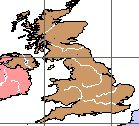Esperanto in the UK

Esperanto in the UK |

|
| Note: expressions in bold are awaiting links. |
 |
| Esperanto is an easy-to-learn, easy-to-use international language. There are articles in English about Esperanto on the WorldWide Web (and in other languages, too). |
The main organisation for Esperanto in the UK is Esperanto-Asocio de Britio (EAB: Esperanto Association of Britain). Previously the main organisation was the British Esperanto Association. EAB was formed as a registered charity.
The youth organisation is Junularo Esperantista Brita (JEB).
There is also an Esperanto Lobby, which was originally formed as part of the Press and Public Relations Committee of the British Esperanto Association, but which is now an independent organisation. Esperanto Lobby has campaigned for Esperanto in various areas, and has been especially successful in enabling the setting up of the Esperanto Parliamentary Group. As members of the European Community, British Esperantists also encourage support of Esperanto in the European Parliament.
An important organisation is the Esperanto Teachers' Association, which represents not only Esperanto teachers, but all those who wish to support the teaching of the language.
There are local Esperanto groups throughout the country, and even some religious services in Esperanto. There are regular federation meetings in many parts of the country, and an annual British Esperanto Conference, and an annual Scottish Esperanto Conference, both held at Easter or on the Spring Bank Holiday weekend. Various courses and seminars take place throughout the year, notably those at Barlaston. An international list of Esperanto meetings is provided by the news magazine Eventoj, and a further list provided by Monda Turismo puts a greater emphasis on Esperanto holidays.
Many Esperanto specialist organisations have sections or representatives in Britain. There is also the Workers' Esperanto Association (SATEB), which has links with the 'non-national' association SAT.
The Norwich Jubilee Esperanto Foundation provides grants to young people for travelling to gain experience of Esperanto, as well as grants for research into the teaching of Esperanto.
Many British Esperantists are members of Universala Esperanto-Asocio (The Universal Esperanto Association). A list of contact addresses for other national associations is given, as well as links to national associations on the Web. International information is to be found in the Virtuala Esperanto-Biblioteko (Virtual Esperanto Library).
A catalogue of learning aids available either from the Esperanto Centre in London or on the Web is available. A free ten lesson correspondence course will soon be available on the Worldwide Web, called 'Esperanto Viva!'. Besides teaching the basics of the language, this course introduces the student to the worldwide speech community, with pictures and hypertext links to various pages of interest.
If you have further questions, feel free to contact Esperanto Association of Britain.
 |
Link: up to English / Welsh / Esperanto index.
| Viva Languages 2000sep07 |